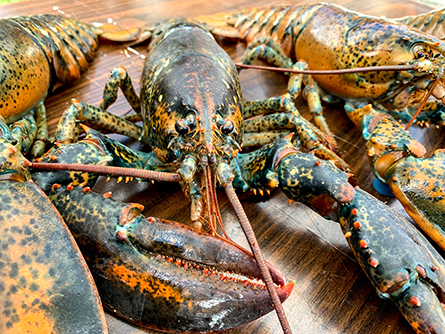Lobsters hold the secret of a long, cancer-free life in their genes
The American lobster — easily recognizable by its two hefty claws — can reach the impressive age of 100 years. The remarkable longevity is accompanied by very few signs of aging; it continuously grows and reproduces throughout its life and does not suffer from age-related diseases such as cancer. This exceptional resilience has garnered interest from researchers that are curious to decipher the reasons behind the lobster’s longevity and good health.

Could the genome of the American lobster provide clues about their healthy aging? Researchers at the Gloucester Marine Genomics Institute have recently published the first draft of the American lobster genome, which revealed surprising, first insights into the animal’s unique resilience mechanisms. Their work was published in the journal Science Advances.
The researchers found genes encoding for a novel class of proteins that combine both neuronal and immune-related functions. By coupling the neural and immune system, the lobster could fight off pathogens more efficiently.
The researchers also surveyed the lobster genome for genes involved in safeguarding the genome. These safeguards prevent genomic alterations and mutations, which is crucial for longevity and warding off cancer. The researchers found that the American lobster has an extended repertoire of genes encoding for proteins that silence certain regions of the genome. These regions need to be silenced to prevent potentially disease-causing mutations such as chromosomal rearrangements. By ensuring that these regions remain silenced, the American lobster safeguards its genome throughout its long life.
With the newly deciphered lobster genome as a starting point, future research will provide further insight into the healthy aging strategies of the American lobster. More than a mere delicacy, the humble lobster could teach us a lot about healthy aging.
This story originally appeared on Massive Science, an editorial partner site that publishes science stories by scientists. Subscribe to their newsletter to get even more science sent straight to you.
Enjoy reading ASBMB Today?
Become a member to receive the print edition four times a year and the digital edition monthly.
Learn moreGet the latest from ASBMB Today
Enter your email address, and we’ll send you a weekly email with recent articles, interviews and more.
Latest in Science
Science highlights or most popular articles

Building a career in nutrition across continents
Driven by past women in science, Kazi Sarjana Safain left Bangladesh and pursued a scientific career in the U.S.

Avoiding common figure errors in manuscript submissions
The three figure issues most often flagged during JBC’s data integrity review are background signal errors, image reuse and undeclared splicing errors. Learn how to avoid these and prevent mistakes that could impede publication.

Ragweed compound thwarts aggressive bladder and breast cancers
Scientists from the University of Michigan reveal the mechanism of action of ambrosin, a compound from ragweed, selectively attacks advanced bladder and breast cancer cells in cell-based models, highlighting its potential to treat advanced tumors.

Lipid-lowering therapies could help treat IBD
Genetic evidence shows that drugs that reduce cholesterol or triglyceride levels can either raise or lower inflammatory bowel disease risk by altering gut microbes and immune signaling.

Key regulator of cholesterol protects against Alzheimer’s disease
A new study identifies oxysterol-binding protein-related protein 6 as a central controller of brain cholesterol balance, with protective effects against Alzheimer’s-related neurodegeneration.

From humble beginnings to unlocking lysosomal secrets
Monther Abu–Remaileh will receive the ASBMB’s 2026 Walter A. Shaw Young Investigator Award in Lipid Research at the ASBMB Annual Meeting, March 7-10 in Washington, D.C.

